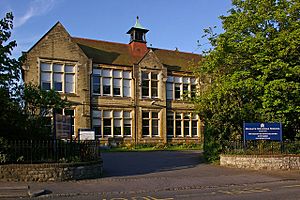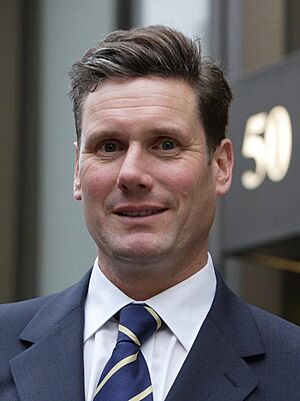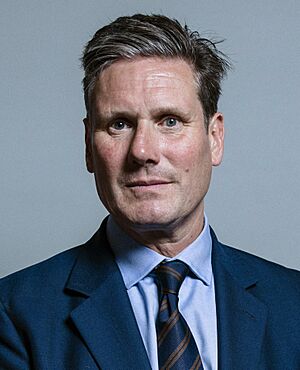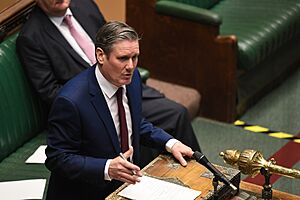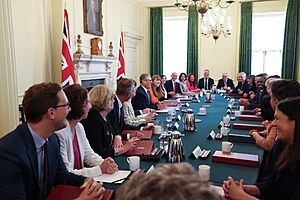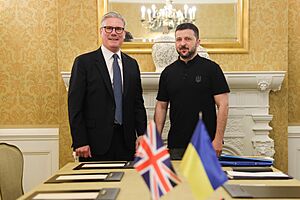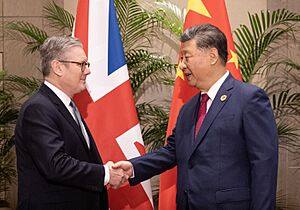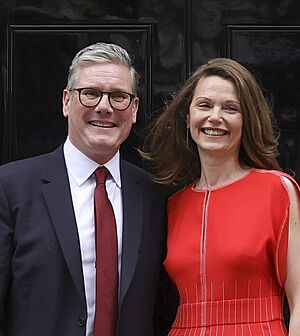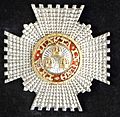Keir Starmer facts for kids
Quick facts for kids
Sir Keir Starmer
|
|||||||||||||||||||||||||
|---|---|---|---|---|---|---|---|---|---|---|---|---|---|---|---|---|---|---|---|---|---|---|---|---|---|
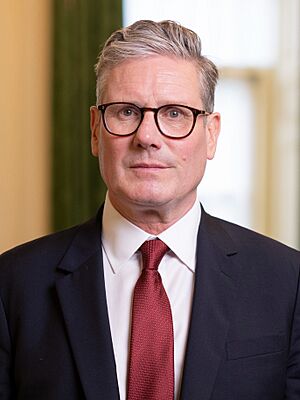
Official portrait, 2024
|
|||||||||||||||||||||||||
| Prime Minister of the United Kingdom | |||||||||||||||||||||||||
| Assumed office 5 July 2024 |
|||||||||||||||||||||||||
| Monarch | Charles III | ||||||||||||||||||||||||
| Deputy | Angela Rayner | ||||||||||||||||||||||||
| Preceded by | Rishi Sunak | ||||||||||||||||||||||||
| Leader of the Opposition | |||||||||||||||||||||||||
| In office 4 April 2020 – 5 July 2024 |
|||||||||||||||||||||||||
| Monarch |
|
||||||||||||||||||||||||
| Prime Minister |
|
||||||||||||||||||||||||
| Deputy | Angela Rayner | ||||||||||||||||||||||||
| Preceded by | Jeremy Corbyn | ||||||||||||||||||||||||
| Succeeded by | Rishi Sunak | ||||||||||||||||||||||||
| Leader of the Labour Party | |||||||||||||||||||||||||
| Assumed office 4 April 2020 |
|||||||||||||||||||||||||
| Deputy | Angela Rayner | ||||||||||||||||||||||||
| Preceded by | Jeremy Corbyn | ||||||||||||||||||||||||
|
|||||||||||||||||||||||||
|
|||||||||||||||||||||||||
| Assumed office 7 May 2015 |
|||||||||||||||||||||||||
| Preceded by | Frank Dobson | ||||||||||||||||||||||||
| Majority | 11,572 (30.0%) | ||||||||||||||||||||||||
| Director of Public Prosecutions | |||||||||||||||||||||||||
| In office 1 November 2008 – 1 November 2013 |
|||||||||||||||||||||||||
| Appointed by | The Baroness Scotland | ||||||||||||||||||||||||
| Preceded by | Ken Macdonald | ||||||||||||||||||||||||
| Succeeded by | Alison Saunders | ||||||||||||||||||||||||
| Personal details | |||||||||||||||||||||||||
| Born |
Keir Rodney Starmer
2 September 1962 Southwark, London, England |
||||||||||||||||||||||||
| Political party | Labour | ||||||||||||||||||||||||
| Spouse | |||||||||||||||||||||||||
| Children | 2 | ||||||||||||||||||||||||
| Residences |
|
||||||||||||||||||||||||
| Education | University of Leeds (LLB) St Edmund Hall, Oxford (BCL) |
||||||||||||||||||||||||
| Occupation |
|
||||||||||||||||||||||||
| Profession | Barrister | ||||||||||||||||||||||||
| Signature | |||||||||||||||||||||||||
Sir Keir Rodney Starmer (born 2 September 1962) is a British politician and lawyer. He has been the Prime Minister of the United Kingdom since July 2024. He also leads the Labour Party since 2020. Before becoming Prime Minister, he was the Leader of the Opposition from 2020 to 2024.
Starmer has been a Member of Parliament (MP) for Holborn and St Pancras since 2015. He also served as the Director of Public Prosecutions from 2008 to 2013. He is known for his work as a lawyer, especially in human rights.
Contents
Early Life and Education
Keir Rodney Starmer was born on 2 September 1962, in Southwark, London. He grew up in Oxted, Surrey. He was the second of four children. His mother was a nurse, and his father was a toolmaker. His parents supported the Labour Party.
Starmer attended Reigate Grammar School. This school became a private school while he was a student. He received a special scholarship that helped him finish his education there. In his teenage years, Starmer was active in youth politics. He also studied music, playing the flute, piano, recorder, and violin.
He was the first in his family to go to university. He studied law at the University of Leeds, graduating in 1985. He then continued his studies at the University of Oxford, earning another law degree in 1986.
Legal Career
Starmer became a barrister in 1987. He worked mainly on human rights cases. He defended people sentenced to death in Caribbean countries. He also helped with important cases like the "McLibel case". In 2002, he became a Queen's Counsel, a special title for experienced barristers.
He advised the Northern Ireland Policing Board on human rights. This work helped bring communities together after the Good Friday Agreement. Starmer said this experience made him want to enter politics. He felt he could make changes faster from inside the system.
Director of Public Prosecutions
In 2008, Starmer was named the Director of Public Prosecutions (DPP). This meant he was in charge of the Crown Prosecution Service (CPS). He brought a focus on human rights into the legal system. During his time as DPP, he handled several major cases. This included the Stephen Lawrence murder case.
He also oversaw the prosecution of politicians involved in a parliamentary expenses scandal. In 2011, he focused on quickly prosecuting people involved in the 2011 England riots. Starmer left his role as DPP in November 2013. In 2014, he was made a Knight Commander of the Order of the Bath (KCB) for his work in law.
Early Political Career
Member of Parliament
Starmer was chosen to be the Labour candidate for Holborn and St Pancras in 2014. This area was a safe seat for the Labour Party. He was elected as an MP in the 2015 general election. He has been re-elected in every election since.
During the 2016 European Union membership referendum, Starmer supported the UK staying in the European Union (EU). He later became the Shadow Brexit Secretary. In this role, he pushed for more transparency on Brexit plans. He also supported a second public vote on Brexit.
Labour Leadership Bid
After Labour's defeat in the 2019 general election, Jeremy Corbyn resigned as leader. Starmer decided to run for the leadership. He promised to continue some of Labour's policies, like ending university tuition fees. He also pledged to bring railways, mail, energy, and water companies back into public ownership.
On 4 April 2020, Starmer won the leadership election. He defeated his rivals, Rebecca Long-Bailey and Lisa Nandy. He received 56.2 percent of the votes.
Leader of the Opposition (2020–2024)
Starmer became Leader of the Opposition during the COVID-19 pandemic. He initially worked with the government. However, he later became more critical of their handling of the pandemic. He also criticized the government for various issues, including the cost of living crisis and public sector strikes.
As Labour Leader, Starmer worked to move the party towards the political centre. He focused on economic stability, improving the NHS, and strengthening workers' rights. He also promised to end antisemitism within the Labour Party. His reforms led to the party no longer being monitored by the Equality and Human Rights Commission in 2023.
Local Election Results
Under Starmer's leadership, Labour made significant gains in local elections. In the 2023 local elections, Labour gained over 500 councillors. They became the largest party in local government for the first time since 2002. They continued to make gains in the 2024 local elections.
2024 General Election
On 22 May 2024, Prime Minister Rishi Sunak announced a general election for 4 July 2024. Labour had a large lead in opinion polls. Starmer released Labour's 2024 manifesto, Change. It focused on economic growth, healthcare, education, and workers' rights.
Starmer led Labour to a major victory in the election. They ended fourteen years of Conservative government. Labour won 411 seats, giving them a 174-seat majority. This was the party's third-best result in terms of seats.
Premiership (2024–present)
Appointment

As the leader of the winning party, Starmer was appointed Prime Minister by King Charles III on 5 July 2024. He became the first Labour Prime Minister since Gordon Brown in 2010. In his first speech, Starmer thanked his predecessor and promised to deliver change.
One of his first actions was to cancel the Rwanda asylum plan. His government established a Border Security Command to tackle illegal migrant crossings. Starmer also toured the four nations of the UK, meeting with local leaders.
Cabinet
Starmer quickly appointed his new Cabinet. This team of ministers helps him run the government. Some members of his Cabinet had also served in previous Labour governments.
Domestic Policy
Starmer's government focuses on economic growth, improving public services, and strengthening workers' rights. They plan to introduce many new laws. These include laws to bring railways and bus services under public control. They also aim to strengthen workers' rights and reform the House of Lords.
Immigration
Starmer's government cancelled the Rwanda asylum plan. They created the Border Security Command to stop illegal crossings. Starmer has also spoken about reducing overall immigration. He later apologized for a phrase he used about immigration, saying it was "not right".
Prison Overcrowding
To help with prison overcrowding, Starmer's government introduced an early release scheme for some prisoners. This allows them to be released after serving 40 percent of their sentence. Starmer has defended this plan, stating that the previous government "broke the prison system".
Healthcare
Starmer's government has committed to ending new HIV cases in the UK by 2030. Starmer himself took a rapid HIV home test on camera in February 2025. In March 2025, he announced plans to reform NHS England to reduce bureaucracy.
Two-child Benefit Cap
Starmer has decided not to remove the two-child benefit cap. This cap limits financial support for families to their first two children. Seven Labour MPs were suspended for voting against this policy. Starmer launched a taskforce to address child poverty.
2024 England and Northern Ireland Riots
Following a tragic incident in Southport, riots occurred across England and Northern Ireland in August 2024. Starmer condemned the violence. He announced a National Violent Disorder Programme to help police forces work together. He called the rioters "far-right thuggery" and ordered a "standing army" to tackle the disorder.
Economy
The new Chancellor of the Exchequer, Rachel Reeves, announced changes to save money. This included ending certain winter fuel payments for some pensioners. Starmer defended this decision, saying "tough decisions" were needed to stabilize the economy.
His government has also settled several public sector strikes. They agreed to increase public-sector worker pay. In October 2024, new employment regulations were put in place. These included an increase in the minimum wage and more rights for workers. The October 2024 budget focused on investment in healthcare, education, and housing.
Acceptance of Gifts
Starmer and other ministers faced criticism in September 2024 for accepting gifts from Labour Party donors. Starmer was also accused of not declaring some gifts, including clothes for his wife.
Foreign Policy
United States

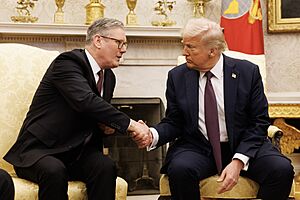
After the 2024 election, US President Joe Biden congratulated Starmer. They discussed the strong relationship between the US and UK. In September 2024, Starmer met with then-presidential candidate Donald Trump in New York. After Trump won the election, Starmer congratulated him. In February 2025, Starmer met President Trump at the White House to discuss support for Ukraine and a possible trade deal.
NATO

Starmer's first overseas meeting as Prime Minister was the 2024 NATO summit in Washington. He promised to increase UK defence spending to meet NATO targets.
Europe
Starmer has aimed to improve UK relations with the European Union after Brexit. He has met with several European leaders. In August 2024, he and German Chancellor Olaf Scholz announced talks to improve cooperation between their countries.
Ukraine-Russia War
At the 2024 NATO summit, Starmer indicated that Ukraine could use British missiles to strike military targets in Russia. He met with Ukrainian President Volodymyr Zelenskyy. Starmer called for Ukraine to have an "irreversible" path to joining NATO. In 2025, Starmer organized a summit of European leaders in London to discuss continued support for Ukraine.
China
In November 2024, Starmer met Chinese President Xi Jinping at the G20 summit. He expressed a desire to build a "consistent, durable, respectful" relationship with China.
Gaza War
Starmer has supported Israel's right to defend itself. He has also called for a ceasefire and more humanitarian aid for Gaza. He supports a two-state solution for peace. In October 2023, he clarified his comments on Israel's right to self-defence, stating he was not supporting cutting off supplies to Gaza.
When he became Prime Minister, Starmer told Israeli Prime Minister Benjamin Netanyahu about the "urgent need for a ceasefire". In November 2024, Starmer's government stated that Netanyahu would be arrested if he traveled to the UK, following an international arrest warrant. In May 2025, Starmer condemned Israel's renewed offensive against Gaza. His government suspended some British arms sales to Israel in September 2024 due to concerns about international law.
Political Positions
Starmer's political views have changed since he became Labour leader. He won the 2020 leadership election on a platform that included left-leaning ideas. However, many of these pledges were later changed or dropped. This was due to changing economic situations.
Some people compare his approach to Tony Blair's "New Labour". Others believe he has no clear political philosophy. Starmer has emphasized reforming public services and giving more power to local areas. He has pledged to abolish the House of Lords and replace it with an elected body.
Starmer strongly supports green policies to fight climate change. He wants to remove fossil fuels from the UK electricity grid by 2030. He also supports LGBT rights, including strengthening protections against hate crimes. He has committed to a "trans-inclusive" ban on conversion therapy.
He has also spoken about reducing crime. Starmer aims to improve training and skills for British workers. This would help reduce the need for overseas employees.
Personal Life
Starmer is married to Victoria Alexander. They have two children, a son and a daughter. Both children are being raised Jewish. The family lived in Kentish Town, north London, before moving to Downing Street.
Starmer is a pescatarian, meaning he eats fish but no other meat. His wife is a vegetarian. Starmer is an atheist, but he attends services with his family at a synagogue. He is a keen footballer and supports Arsenal. In September 2024, his family got a Siberian kitten named Prince.
Awards and Honours
In 2002, Starmer was appointed Queen's Counsel. He received an award in 2005 for his work challenging the death penalty in various countries. In 2022, he became an Honorary Fellow of St Edmund Hall, Oxford. Time magazine listed him as one of the world's 100 most influential people in 2025.
He was knighted in 2014 for his contributions to law and criminal justice. This made him a Knight Commander of the Order of the Bath (KCB). He has also received several honorary degrees from universities. In 2017, he became a member of the Privy Council, which gave him the title "The Right Honourable".
Images for kids
See also
 In Spanish: Keir Starmer para niños
In Spanish: Keir Starmer para niños
 | Victor J. Glover |
 | Yvonne Cagle |
 | Jeanette Epps |
 | Bernard A. Harris Jr. |


